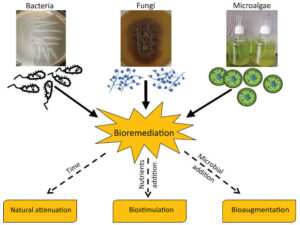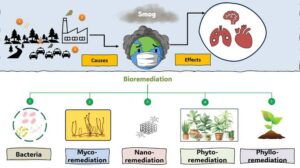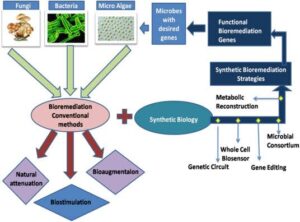Back to: MICROBIOLOGY 100 LEVEL
Welcome to class!
You’re welcome to another exciting learning session. Today, we’re going to discover how something as tiny as a microbe can do some pretty big things. Our topic is Microbes in Fermentation and Bioremediation. Now, you might be surprised, but these tiny organisms are actually very helpful — they’re used in making food and even cleaning the environment. Let’s look at how microbes serve us in these amazing ways.
Microbes In Fermentation And Bioremediation
Fermentation
Fermentation is a process where microbes like bacteria and fungi break down sugars to produce useful products — usually in the absence of oxygen. This process has been used by Africans for centuries to produce food, drinks, and medicine.

Some common examples you’ll recognise in Nigerian homes:
Yoghurt – made using Lactobacillus bacteria that ferment milk.
Pito and palm wine – traditional drinks made through fermentation of maize and palm sap using yeasts.
Fufu and ogi (pap) – made by fermenting cassava or maize with natural bacteria.
In fermentation:
The microbes convert sugars into alcohol, acids, or gases.
These by-products can preserve food, enhance flavour, and improve digestion.
It’s used in industries to produce items like bread, cheese, vinegar, and even biofuels.

Example: When cassava is soaked in water for fufu preparation, natural bacteria ferment the starch, giving it that slightly sour smell and making it safe to eat.
Bioremediation
Bioremediation is like nature’s clean-up crew. It’s the use of microbes to remove or neutralise pollutants from the environment — like oil spills, sewage, or chemical waste.
In this case, bacteria and fungi break down harmful substances into non-toxic or less harmful substances.
Types of bioremediation:
Oil spill clean-up – certain bacteria like Pseudomonas break down crude oil in polluted waters.
Sewage treatment – microbes digest waste materials in treatment plants.
Heavy metal removal – microbes can bind and remove metals like mercury or lead from soil.
Example: After an oil spill in the Niger Delta, certain bacteria are introduced to feed on the oil and break it down into safer compounds — a process that helps save the soil, water, and aquatic life.

Why This Matters
In a country like Nigeria, where food processing and environmental pollution are major issues, microbes play a vital role in offering affordable, eco-friendly solutions. From the garri you eat to the river that’s been polluted, microbes are hard at work!
Summary
- Microbes are tiny organisms that can be helpful in processes like fermentation and bioremediation.
- Fermentation is the microbial breakdown of sugars without oxygen to make food and drinks.
- Nigerian fermented foods include fufu, ogi, yoghurt, and palm wine.
- Bioremediation uses microbes to clean up environmental pollutants like oil spills and sewage.
- These processes show how microbes support both health and the environment.
Evaluation
- What is fermentation and which microbes are involved in it?
- Name two Nigerian foods made using fermentation.
- Define bioremediation and give one example of how it works.
- Why are microbes important in the environment?
You’ve just uncovered how powerful microbes can be in food and environmental health. Isn’t it amazing how the tiniest organisms can make the biggest difference? Keep going — the more you learn, the more you grow. Afrilearn is proud to be your learningpartner. See you in the next class!
